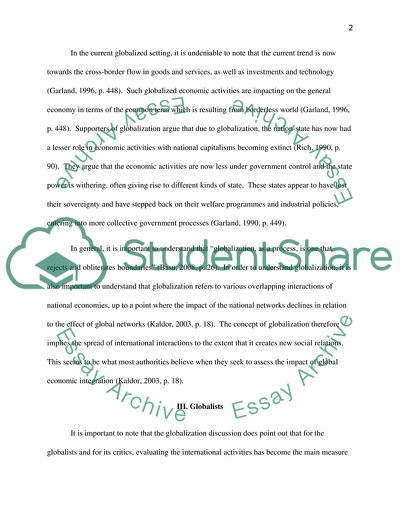Cite this document
(The Impact of Globalization on the Effectiveness of Traditional Policy Instruments Essay Example | Topics and Well Written Essays - 2250 words - 1, n.d.)
The Impact of Globalization on the Effectiveness of Traditional Policy Instruments Essay Example | Topics and Well Written Essays - 2250 words - 1. https://studentshare.org/politics/1784949-with-the-increase-in-global-interconnectedness-the-scope-of-strategic-policy-choices-available-to-individual-governments-and-the-effectiveness-of-many-traditional-policy-instruments-tends-to-decline-held-and-mcgrew-200313-disuss
The Impact of Globalization on the Effectiveness of Traditional Policy Instruments Essay Example | Topics and Well Written Essays - 2250 words - 1. https://studentshare.org/politics/1784949-with-the-increase-in-global-interconnectedness-the-scope-of-strategic-policy-choices-available-to-individual-governments-and-the-effectiveness-of-many-traditional-policy-instruments-tends-to-decline-held-and-mcgrew-200313-disuss
(The Impact of Globalization on the Effectiveness of Traditional Policy Instruments Essay Example | Topics and Well Written Essays - 2250 Words - 1)
The Impact of Globalization on the Effectiveness of Traditional Policy Instruments Essay Example | Topics and Well Written Essays - 2250 Words - 1. https://studentshare.org/politics/1784949-with-the-increase-in-global-interconnectedness-the-scope-of-strategic-policy-choices-available-to-individual-governments-and-the-effectiveness-of-many-traditional-policy-instruments-tends-to-decline-held-and-mcgrew-200313-disuss.
The Impact of Globalization on the Effectiveness of Traditional Policy Instruments Essay Example | Topics and Well Written Essays - 2250 Words - 1. https://studentshare.org/politics/1784949-with-the-increase-in-global-interconnectedness-the-scope-of-strategic-policy-choices-available-to-individual-governments-and-the-effectiveness-of-many-traditional-policy-instruments-tends-to-decline-held-and-mcgrew-200313-disuss.
“The Impact of Globalization on the Effectiveness of Traditional Policy Instruments Essay Example | Topics and Well Written Essays - 2250 Words - 1”. https://studentshare.org/politics/1784949-with-the-increase-in-global-interconnectedness-the-scope-of-strategic-policy-choices-available-to-individual-governments-and-the-effectiveness-of-many-traditional-policy-instruments-tends-to-decline-held-and-mcgrew-200313-disuss.


